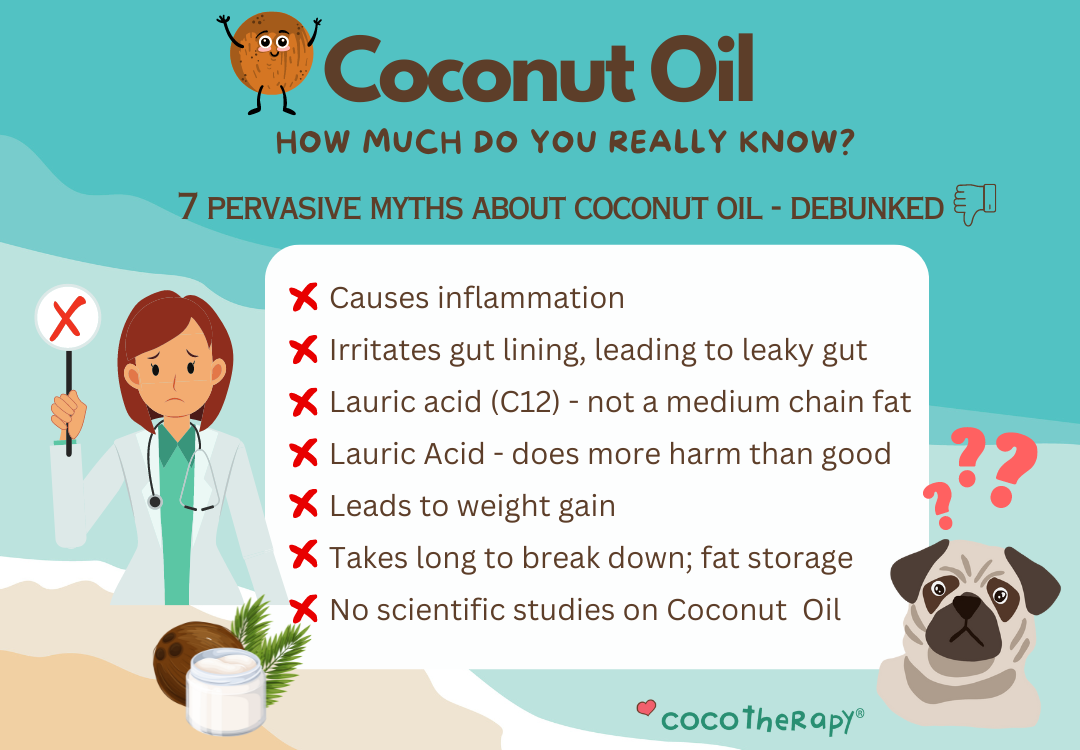Although coconut oil is often praised for its health benefits, there's still plenty of debate about whether it's good for our pets. Here at CocoTherapy, we see myths and misconceptions about coconut oil all the time – and we've written several blog posts on the topic.
But if you're still unsure about whether coconut oil is a beneficial addition to your pet's diet, we're here to help you separate fact from fiction. In this post, we'll explore some of the most pervasive myths about coconut oil and provide evidence-backed facts to help you make an informed decision for your furry friend. Ready to dive in? Then let's get started!

Myth 1: Coconut Oil Increases Inflammation
The claim that coconut oil contributes to inflammation in pets is a source of confusion for many pet parents. This myth is often based on the fact that coconut oil contains medium-chain triglycerides (MCTs), which are saturated fats.
The Reality
Modern research has turned the table on the longstanding myth that coconut oil, being rich in saturated fats, exacerbates inflammation. Contrary to popular belief, coconut oil possesses unique fatty acids that can actually play a beneficial role in managing inflammation. Here's a quick overview of the facts:
- Medium-chain triglycerides (MCTs). Coconut oil is abundant in MCTs, which are metabolized differently compared to other fats, leading to anti-inflammatory benefits.
- Lauric acid. This key component of coconut oil is known for its antimicrobial properties, further supporting its anti-inflammatory effects.
- Research insights. Studies have shown that when included in a balanced diet, coconut oil does not contribute to increased inflammation markers. In fact, it's linked to improved health outcomes due to its unique composition. In one study, researchers found that obese pigs fed coconut oil had less inflammation, suggesting coconut oil helps control it. Another study found that coconut oil helped reduce inflammation in lung cells by affecting certain cell pathways, further pointing to its anti-inflammatory benefits.
Myth 2: Coconut Oil Irritates the Gut Lining and Leads to Leaky Gut
The worry that coconut oil might irritate the gut lining and lead to leaky gut syndrome has been a point of discussion among pet parents. Misinterpretations and generalizations in studies have led to this concern.
The Reality
Despite these claims, evidence suggests that the medium-chain fatty acids (MCFAs) in coconut oil are actually beneficial to gut health. This is because MCFAs are easier to digest and possess antimicrobial properties that can help regulate gut flora. In addition, coconut oil contains lauric acid, which has been found to improve gut barrier function and reduce inflammation in the digestive tract.
Specialists like Dr. Bruce Fife, an expert in the field of lipids, emphasize the difference between MCFAs found in coconut oil and long-chain fatty acids found in other fats, highlighting the anti-inflammatory and antimicrobial nature of MCFAs.
Additionally, research shows that the medium-chain fatty acids (MCFAs) in coconut oil are absorbed directly into the liver through the portal vein, avoiding transport of endotoxins (toxins released from bacterial cell walls) into the bloodstream.
For a deeper understanding, check out our previous post on leaky gut syndrome and our interview with Dr. Bruce Fife about the fallacy that coconut oil induces Endotoxemia in dogs.
Myth 3: Lauric Acid Is Not a Medium-Chain Fatty Acid
Lauric acid (C12), which makes up a significant portion of coconut oil, is often misclassified. Some sources claim it's a long-chain fatty acid, which leads to the misconception that coconut oil is harmful. In fact, lauric acid is classified as a MCFA by chemistry databases (ChEBI, PubChem, ChemSpider) and the American Oil Chemist Society, and is metabolized primarily as a MCFA and not a long-chain fat.
The Reality
Lauric acid contains 12 carbon atoms. It behaves like a medium-chain fatty acid (MCFA) and quickly converts to energy. Lauric acid (C12) possesses distinct qualities not present in longer-chain saturated fatty acids. Due to the differing metabolic and physiological effects of medium-chain fatty acids (MCFAs) compared to long-chain fatty acids (LCFAs), numerous research proposes that it is more accurate to classify them based on chain length as "medium-chain" (C6-C12) and "long-chain" (≥ C14).(1,2,3)
In addition, this fast metabolism reduces the chance of lauric acid leading to fat storage, contradicting concerns about its impact on pet health. Instead, it provides a quick, usable form of energy, supporting active and healthy pets. For this reason, it's an excellent source of fuel for all mammals – including our furry companions.
For more information, check out this article from the Philippine Journal of Science. It dives into the science behind lauric acid and its unique properties in coconut oil.
(1) GORANSSON G. 1965. The Metabolism of Fatty Acids in the Rat. VIII. Lauric Acid and Myristic Acid. Acta physiol scand 64:383-386. GREENBERGER NJ, RODGERS JB, ISSELBACHER
(2) KJ. 1966. Absorption of Medium and Long Chain Triglycerides: FactorsInfluencing Their Hydrolysis and Transport. J Clin Inv 45(2):217-227.
(3) HAMILTON JA. 1998.Fatty acid transport: difficult or easy? J Lipid Res 39:467–481. HARKINS RW, SARETT HP. 1968.
Myth 4: Lauric Acid Does More Harm Than Good
The debate around lauric acid doesn't end with its classification. Some sources claim that it can do more harm than good, suggesting that as a saturated fat, it could contribute to health issues such as high cholesterol and heart disease.
The Reality
Far from being harmful, lauric acid has been found to have numerous health benefits. In a 2015 article for the Journal of the American Oil Chemists' Society, Fabian M. Dayrit highlights some of the most notable benefits of lauric acid.
These include its rapid metabolism for energy, minimal contribution to fat accumulation, and significant antimicrobial activity against various pathogens. This beneficial fatty acid is also less impactful on cholesterol levels compared to long-chain saturated fats and plays a role in supporting the immune system.
Lauric acid possesses significant anti-inflammatory effects. When ingested, the body converts lauric acid into monolaurin, a potent disease-fighting compound. Research dating back to 1966 demonstrates that monolaurin effectively combats a wide range of microorganisms, including bacteria, yeast, fungi, and enveloped viruses.
Myth 5: Being High in Saturated Fat and Calories, Coconut Oil Leads to Weight Gain
Another common misconception is that coconut oil leads to weight gain due to its high saturated fat and calorie content. Unfortunately, this pervasive myth has led pet parents to avoid incorporating coconut oil into their pet's diet, missing out on its many health benefits.
The Reality
As we've discussed earlier, the medium-chain fatty acids (MCFAs) in coconut oil are metabolized differently than long-chain fatty acids found in other fats. This means they're not stored as fat in the body but rather quickly converted into energy. What’s more, MCFAs have been linked to increased satiety, helping pets feel fuller for longer and reduce the chances of overeating.
Coconut oil's ability to increase energy expenditure and aid weight loss has also been backed up in recent scientific literature. (4)
It's also important to note that dogs and cats thrive on saturated fats, and don't respond to them the same way that humans do. In his article for the Journal of the American Veterinary Medical Association, Facilitative and Functional Fats in Diets of Cats and Dogs, Dr. John Bauer, DVM., PhD., explains:
"Although the concept of good and bad fats is appropriate for human health, dogs and cats are able to consume both types of fats in their diets without undue risk of coronary artery diseases, heart attacks, or strokes to which humans succumb. The simplified reason for this is that they have more good cholesterol (HDL) than bad cholesterol (LDL) to begin with, no matter what types of fat they consume. Second, in contrast to humans, dogs and cats typically are resistant to the development of hypercholesterolemia and atherosclerosis, even when they consume amounts of dietary fat that would typically turn human blood into sludge."
(4) St-Onge MP, Bourque C, Jones PJ, Ross R, Parsons WE. Medium- versus long-chain triglycerides for 27 days increases fat oxidation and energy expenditure without resulting in changes in body composition in overweight women. Int J Obes Relat Metab Disord. 2003 Jan;27(1):95-102. doi: 10.1038/sj.ijo.0802169. PMID: 12532160.
Myth 6: Coconut Oil Takes Longer to Break Down, So There's a Greater Potential for Fat Storage
Similar to the previous myth, some sources claim that coconut oil takes longer to break down in the body, leading to a higher chance of fat storage and weight gain.
The Reality
Unlike long-chain fats, the medium-chain fatty acids in coconut oil are rapidly broken down in the liver and converted into energy. They do not need bile acids or pancreatic lipase to be metabolized. In the article, Digestion and Absorption of Food Fats, world-renowned lipid expert, Dr. Mary Enig, PhD states:
"The digestion of regular fats and oils, which are usually long-chain triglycerides, requires bile acids as well as lipases. In adults this digestion usually starts in the small intestine and is done with the aid of lipases and bile acids. Short- and medium-chain fatty acids from fats such as milk fat or coconut oil or palm kernel oil are broken off from the triglycerides without the need for bile acids. They are then shuttled directly to the liver through the portal artery without the use of chylomicrons." (5)
(5) MI Gurr & AT James. Lipid Biochemistry: An Introduction. Chapman and Hall, London, 1971. Mary G. Enig, Ph.D. Know Your Fats: The Complete Primer for Understanding the Nutrition of Fats, Oils, and Cholesterol. Bethesda Press, Silver Spring, Maryland, 2000.
Myth 7: There Are No Scientific Studies on Coconut Oil
This final myth is one that definitely couldn't be further from the truth! In fact, there are so many studies and articles detailing the numerous benefits of coconut oil that it's impossible to cover them all in one blog post.
The Reality
From its antimicrobial properties to its ability to support healthy metabolism and immune function, the research on coconut oil continues to grow and expand. In addition to the studies and articles mentioned throughout this post, there's an extensive body of research highlighting the benefits of coconut oil for both humans and pets.
These include potent antimicrobial properties, anticancer effects, cardiovascular benefits, and a whole lot more! That's why it's important not to let myths and misconceptions about coconut oil hold you back from providing your pet with one of nature's most beneficial superfoods.
Download Our FREE Scientific Studies eBook!
Ready to dive into the research and learn more about the multitude of benefits that coconut oil can offer? You're in luck.
We've created a comprehensive eBook that includes some of the most notable and important studies on coconut oil. It's 100% free and available for download now. Simply visit our website, tell us where to send it, and get ready to become a coconut oil expert!
Here's where to grab your copy: The Science Behind CocoTherapy: Your Exclusive Gateway to Scientific Research Articles.



